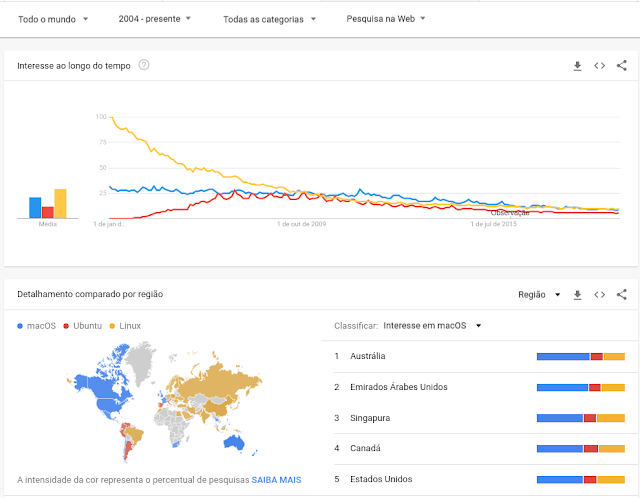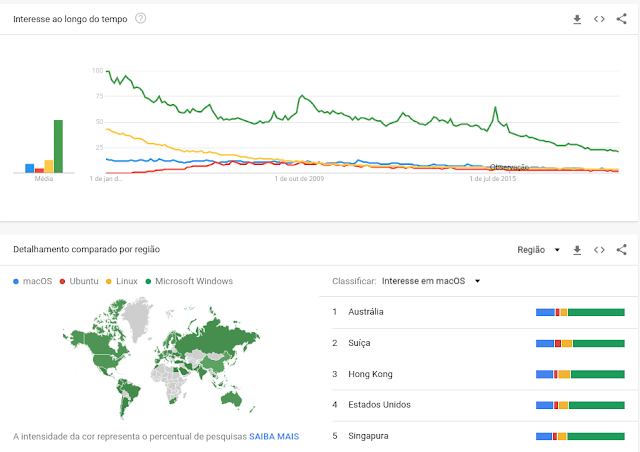First of all, it is interesting that you read the original article from Digital LookIt's basically a transliteration of a video of Linus Torvalds, in the same legendary chat where he sends his middle finger to Nvidia.
This 2012 video and Digital Look article mixes some current concepts with the old ones. In the world of technology a lot of things change in 7 years, in the Open Source world then, you don't even talk about it, in my opinion, Torlvads had and is right.
Desktop is the only place Linux has not taken over, according to Linus Torvalds
The very interesting video indeed, when asked about Desktop is still the only place where Linux does not dominate, Torvalds shows a bit of frustration, stating that "The Desktop was his initial intent when developing Linux, and currently the only place where Linux has not gained the most popularity"
The reason, he said, is that Linux distros often don't come pre-installed with the computers and laptops that people buy. "Nobody wants to have to download and install an operating system to use a computer.", he comments.
Is he right?
Although much (indeed!) Has changed from 2012 to c, in fact, people generally do not format their computers and install systems. This is usually the task of technicians and users who enjoy working with computers.
Much of the unpopularity of Linux is tied to it, without a doubt. The popularity also ends up affecting, by table, other technologies, software and services in this environment.
Want an example?
Why do high-quality Hollywood software like Nuke, Lightworks, Maya, Blender and DaVinci Resolve have versions for Linux and Adobe Premiere, After Effects, on?
Because in the Hollywood industry, Open Source is a standard and a trend, Linux is used in production, in this medium (which is a niche), Linux is one of the priests, while Adobe software, while blockbusters From time to time, they are generally known to be used by smaller studios and semi-professionals who learn to use Windows and want to be serviced that way, besides MacOS, of course.
Not right or wrong, good or bad, just a realization of how things are.
The Android Case
Linus comments that the success of Linux through Android is due to the fact that the system has already been preinstalled on devices, which has never happened on a large scale on desktops, in fact.
It is currently possible to swap Android ROMs, but a small portion of the population does, and most do not even know that there is such a possibility.
Would Chrome OS be the way out?
Torvalds has commented several times that he believes that probably the Linux medium can reach people's homes on their laptops through the popularization of these devices, or even an Android Desktop, and I believe it is correct.
What about the other distros?
In many cases the Linux world moved on. There are dozens of projects for different purposes, but restricting us to the desktop, we see the main players on this board focus on one type of desktop user, not on any one.
Ubuntu, Fedora, Pop! _OS, elementary OS, Linux Mint, Manjaro and Solus OS are all good examples of this.
Each has a slightly different focus and seeks to offer tools to make life easier for its users, but in fact, generally such users have a slightly higher technical level. You might even think that anyone could install a Linux system today, but just installing an operating system, as Linus Torvalds commented, makes you a different user than most.
Of those on the list, several have made it clear that they are focusing on the famous "Creators, Makers, Builders", as in our interview with the people of Sytem76, Linux computer maker and developer of Pop! _OS:
I think it is quite possible for most (and not necessarily the largest) population to use Linux without any major problems, probably in a number that never gets past Windows, but with full capabilities to beat MacOS.
Here's an interesting chart for you to see:

This is a graph of Google Trends. Google is the ideal place to measure popularity, where people, mostly and mostly, go to search for information.
The analysis is done with a data collection from 2004 onwards, and it becomes more reliable, according to Google itself, from mid-2006 2008 onwards, where adjustments were made in the sensitivity of the search algorithm.
The blue line corresponds to Apple's macOS, from red to Canonical Ubuntu, and the yellow line to Linux (related to Software) in general.
We can see that interest in Linux software is greater than interest in macOS, second only to some regions of the English-speaking world, such as the US, Canada, Australia, South Africa, etc. While Interest in Linux appears to be widespread in Europe and Brazil, so does Ubuntu, which is not greater than interest in Linux in general in Brazil, but is the most relevant distraction in this regard.
The term "Linux" is quite generic to consider, although distros use the Linux kernel, they are not the same operating system, although they have several things in common.
We see Ubuntu being very popular in the UK for example, which is Canonical's physical headquarters (or one of them), but not so much in the US, for example.
Interest in Ubuntu and Linux around the world compared to macOS shows that there is indeed a market willing to explore new things, to the point that even if people don't have so many options for pre-installed Linux computers, they still manage. data of sufficient interest to create these numbers.
Windows in this graph is way above the other operating systems:
 |
| Green Windows |
Although, like the others, has been losing interest in the public because of the nod of Smartphones, most likely. Just compare with the interesting thing about Android and its nod in recent years:
 |
| Android in Purple |
So would it be a lost case for other distros than Chrome OS?
Well, it depends: Are you rushing to something? Do you really need some Linux distro to become the most popular system of all?
If you asked me, I'd say no, I don't need to. But I would also say yes, it would be nice if it were a little more popular to balance the balance. No interesting monopoly and many people could benefit from greater popularity. There are many cases that people use Windows because they need it, not because they want it.
Some time ago I needed to work in a suit (something I never liked), I needed it because of the kind of job, but I never really wanted that for myself, so much so that I just left the place and that was a big reason. I felt uncomfortable and no one likes to feel obligated to something, especially when they have contrary thoughts about it. I bet a lot of people put it on using Windows.
The truth is that Linux desktop distros are becoming friendlier, and yes, they have a lot of growth potential and are made to please anyone who basically pleases them.
They are there to give you choices, to keep you from getting stuck with something you might not like, for example:
In this video entitled "For you who are fed up with Windows", I showed that there may be alternatives, even if not for everyone, for many people.
Fantastic feedback, you can see by the amount of views and the comments.
I'm still a fan of technology, I like Windows and macOS and I think they are amazing solutions to a lot of problems (because in the end that's what technology is for, helping you solve problems), I just don't think they're irreplaceable and not unique. And in many cases, Linux may be more efficient or a more comfortable solution for several reasons.
Part of our work at Diolinux is helping other people who also enjoy using Linux and want to help each other do it.
I keep using Linux on my Desktop for video production, image editing and music, text and games (yes, games! Check out our Twitch channel) simply because it suits me, because I like it, because I prefer it, because I feel happier and happier about it, if nothing changes in a few years and Linux does not grow more on the Desktop, I will most likely continue to use Linux for one reason: Why does it work and lets me do everything I need to do for him.
I have no reason for "allergies" to other systems, using Linux allowed me to see a wider world, beyond what I thought was a computer or operating system, opened up my view so much that I see that even perfect Linux, Quite the contrary, but the world is made up of more than "windows" and "buts", yet I love to enjoy the view from a beautiful "window", eating a "Mctosh" juicy.
See you next time!
_____________________________________________________________________________ See any errors or would you like to add any suggestions to this article? Collaborate, click here.
